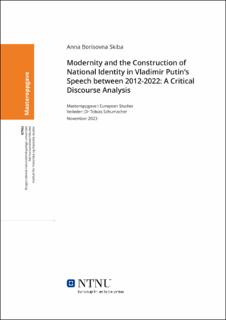| dc.contributor.advisor | Schumacher, Tobias | |
| dc.contributor.author | Skiba, Anna Borisovna | |
| dc.date.accessioned | 2024-01-06T18:19:54Z | |
| dc.date.available | 2024-01-06T18:19:54Z | |
| dc.date.issued | 2023 | |
| dc.identifier | no.ntnu:inspera:155667667:91404616 | |
| dc.identifier.uri | https://hdl.handle.net/11250/3110263 | |
| dc.description.abstract | Basert på tilnærmingene innen kritisk diskursanalyse og diskurs-historisk analyse, tar denne studien sikte på å utforske komplekse sider ved det moderne behovet for nasjonal identitet slik det kommer til uttrykk i Vladimir Putins taler fra 2012 til 2022. Studien ser spesielt på hvordan Russland forholder seg til sin historie og hvordan Putin bruker denne historien for å bygge sin identitet. Vi ser nærmere på temaer som historisk minne (inkludert primordialisme og Den store fedrelandskrigen), etnisitet og anti-moderne holdninger (basert på diskursen om 'Den russiske idéen') i presidentens taler. Den konseptuelle rammeverket fokuserer på eksisterende forskning, viktige elementer av russisk historie og tilgjengelige data. I stedet for å kategorisere og konseptualisere ideologi i tale, har det som mål å avdekke forholdet mellom de valgte aspektene, slik de gjenspeiles i Vladimir Putins språk. Denne tilnærmingen gir en bredere kommentar om modernitet og nasjonsbygging, og understreker den komplekse sammenhengen mellom ulike diskurser i presidentens tale. Studien argumenterer for behovet for å bedre forstå utviklingen innen nasjonalistiske bevegelser og viktigheten av å finne enighet om hvordan nasjonsbygging konstrueres. | |
| dc.description.abstract | Rooted in the methodological approach of critical discourse analysis and the discourse-historical approach, this longitudinal study aims to explore key issues regarding the mod-ern need for national identity expressed in the case of Vladimir Putin’s speech between 2012-2022. Focusing on Russia's engagement with its historical past and the strategic use of this past in Vladimir Putin’s identity construction, the research examines key aspects such as historical memory (including primordialism and the Great Patriotic War), ethnicity, and anti-modern attitudes (based on the discourse of “The Russian Idea”) in the presi-dent’s discourse. The conceptual framework focuses on existing research, important ele-ments of Russian history, and the data at hand. Instead of further categorising and con-ceptualising ideology in speech, it aims to uncover the relationship between the chosen aspects, reflected in Vladimir Putin’s language. This approach offers a broader commen-tary on modernity and nation-building, highlighting the complex interconnection of differ-ent discourses in the president’s speech. The study advocates for a deeper understanding of the evolving nature of nationalist movements, emphasizing the necessity of finding es-sential consensus on constructivist features of nation-building. | |
| dc.language | eng | |
| dc.publisher | NTNU | |
| dc.title | Modernity and the Construction of National Identity in Vladimir Putin's Speech between 2012-2022. A Critical Discourse Analysis. | |
| dc.type | Master thesis | |
